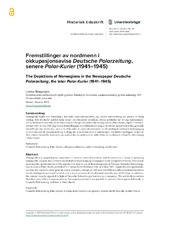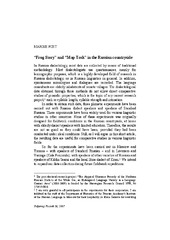Blar i tittel Artikler, rapporter og annet (språk og kultur)
Viser treff 426-445 av 1359
-
Frå einskap til ulikskap? Ei gransking av genustilhøvet ved avleiingar på -skap i skandinavisk
(Journal article; Tidsskriftartikkel; Peer reviewed, 2004)Denne artikkelen tek utgangspunkt i Hans-Olav Engers (2001) oppmoding om at kategorien “genus” i norsk bør granskast grundigare. Etter ei oversikt over sentrale teoriar innanfor genusforsking følgjer ei undersøking av genustilhøvet ved avleiingar på <i>-skap</i> i skandinavisk. Desse orda kan vere både maskulinum og nøytrum i dansk, svensk og norsk. Avsnitt 3 gjer greie for opphav av og genustilhøvet ... -
Frå Prigozjin til Pugatsjov: kupp og oppstand i Russland før og no
(Journal article; Tidsskriftartikkel, 2023-08-04) -
Free reflexives: Reflexives without a sentence-internal antecedent
(Journal article; Tidsskriftartikkel; Peer reviewed, 2014-08-22)Unbound reflexives exist in Icelandic and Faroese in contexts where an “author” or a logophoric center has been established in the discourse, as has been discussed by Maling (1984) and Sigurðsson (1990) for Icelandic, and Barnes (1986) for Faroese. -
"Free transposition" of The Life of Theodore Studite
(Journal article; Tidsskriftartikkel; Peer reviewed, 2012-01-01)This article deals with the manuscript tradition named "free transposition" applied to The Life of Theodore Studite in Old Russian literature. Evidence is presented that the author of this "free transposition" was indeed Nil Sorskij. The investigation of eight recently discovered copies has made it possible to establish their mutual interdependence and to construct the corresponding stemma. -
Fremstillingen av nordmenn i okkupasjonsavisa Deutsche Polarzeitung, senere Polar-Kurier (1941-1945)
(Journal article; Tidsskriftartikkel; Peer reviewed, 2022-03-11)Propaganda hadde stor betydning i den tyske nasjonalsosialismen, og i denne sammenheng var pressen et viktig redskap. Det ble derfor etablert tyske aviser i de okkuperte områdene. Denne artikkelen tar for seg representasjoner av nordmenn over tid i en av disse avisene i Norge: Deutsche Polarzeitung, senere Polar-Kurier, utgitt i Tromsø 9. februar 1941–6. mai 1945. Jeg viser at fremstillingene av ... -
Fremstillinger av nordmenn i okkupasjonsavisa Deutsche Polarzeitung, senere Polar-Kurier (1941–1945)
(Journal article; Tidsskriftartikkel; Peer reviewed, 2022-03-11)Propaganda hadde stor betydning i den tyske nasjonalsosialismen, og i denne sammenheng var pressen et viktig redskap. Det ble derfor etablert tyske aviser i de okkuperte områdene. Denne artikkelen tar for seg representasjoner av nordmenn over tid i en av disse avisene i Norge: Deutsche Polarzeitung, senere Polar-Kurier, utgitt i Tromsø 9. februar 1941–6. mai 1945. Jeg viser at fremstillingene av ... -
The French foot revisited
(Journal article; Tidsskriftartikkel; Peer reviewed, 2013)This article aims to re-evaluate the relevance of the foot in French. After a critical review of the literature on the subject, with reference to both adult and child language, we argue that the prosodic structure of French is best understood within a grid-only framework. The model is couched in Stratal Optimality Theory and illustrated with naturalistic data drawn from southern French and Swiss ... -
Fridtjof Nansen som forfatter : en litterær vurdering av reiseskildringene
(Journal article; Tidsskriftartikkel; Peer reviewed, 2012)The article gives an evalutation of Fridtjof Nansen´s travelogues and expedition reports from a literary perspective, focusing on Gennem Sibirien (1914). -
Fridtjof Nansen's Farthest North : Scientific Report or Personal Account?
(Journal article; Tidsskriftartikkel; Peer reviewed, 2008) -
“Frog Story” and “Map Task” in the Russian countryside
(Journal article; Tidsskriftartikkel, 2007)In Russian dialectology, most data are collected by means of traditional methodology. Most dialectologists use questionnaires, mainly for lexicographic purposes, which is a highly developed field of research in Russian dialectology, as in Russian linguistics in general. In addition, spontaneous monologues and dialogues are recorded. The language consultants are elderly inhabitants of remote ... -
From compound nouns to case marking: Prolatives in South Saami and Lule Saami
(Chapter; Bokkapittel, 2015)This article discusses the morphology, syntax and semantics of the previously underdescribed denominal formations in -raejkiem and -raejkien in present-day written South Saami, and their etymological and functional counterpart -rájge in Lule Saami. As the topic has been mostly described in occasional dictionary entries but largely ignored in grammatical descriptions, the present article provides ... -
From data to theory: An emergent semantic classification based on the large-scale Russian constructicon
(Journal article; Tidsskriftartikkel; Peer reviewed, 2023-10-19)The semantic classification of over 2,200 constructions in the Russian Con- structicon has emerged objectively from empirical analysis. The resulting semantic classification comports with and goes beyond frame semantics, revealing complex patterns of related constructions verified against corpus data and by a panel of native speakers. Our model of a constructicon can inform and complement existing ... -
From Diagnostics of the Present to Architectures of Preferable Futures: Precarity, Polarization, and the Need for a Progressive Utopian Populism
(Conference object; Konferansebidrag, 2024) -
From machine learning to classroom learning: mobile vowels and the Russian preposition v ‘in(to)’
(Journal article; Tidsskriftartikkel; Peer reviewed, 2023)The present study reports on a machine learning experiment concerning mobile vowels in the Russian preposition v ‘in(to)’. It is shown that a neural network is able to predict mobile vowels in 97.4% of the cases in our dataset, and a decision tree is used to extract a set of three rules that a language learner can use to achieve nearly the same level of accuracy. We argue that these rules are ... -
From the Origins of Government and Binding to the Current State of Minimalism
(Chapter; Bokkapittel, 2021)This chapter provides a review of the current Chomskyan approach to the study of human language, known as the Minimalist Program. It offers an overview of the central ideas that were central in shaping the program, in particular Government and Binding Theory. It presents an outline of what the essential ideas of the program are, focusing in particular on how the Minimalist Program is seen as a natural ... -
Full Transfer Potential in L3/Ln Acquisition Crosslinguistic Influence as a Property-by-Property Process
(Chapter; Bokkapittel, 2023-07-13)This chapter discusses L3/Ln acquisition as a step-by-step acquisition process, where crosslinguistic influence is considered to be the result of co-activation of lexical items and syntactic structures of the previously acquired languages in processing. That is, as argued by the Linguistic Proximity Model and the Scalpel Model, L3/Ln acquisition is learning by parsing/processing. The main focus of ... -
Functional neural architecture of cognitive control mediates the relationship between individual differences in bilingual experience and behaviour
(Journal article; Tidsskriftartikkel; Peer reviewed, 2023-04-03)Bilinguals have often, but not always, been found to outperform monolinguals on domain-general attentional control. Inconsistent findings have been argued to stem, at least partly, from treating bilingualism as a uniform category and from not considering how neural adaptations to bilingual experiences modulate behavioural outcomes. The present study investigated how patterns of language experience, ... -
Future directions in examining neurological adaptation to bilingual experiences
(Journal article; Tidsskriftartikkel; Peer reviewed, 2019-09-16)In recent years, research examining the neurocognitive effects of bilingualism has undergone a shift in focus towards examining the neurocognitive effects of individual differences within specific aspects of language experience. The DeLuca et al study advances this direction in showing a specificity of neural adaptations to separate aspects of language experience. However, this approach is an early ... -
Future tense
(Journal article; Tidsskriftartikkel; Peer reviewed, 2014-08-22) -
Future time reference in Lule Saami, with some remarks on Finnish
(Journal article; Tidsskriftartikkel; Peer reviewed, 2016)The paper provides an account of future time reference (FTR) in Lule Saami. While previous accounts of the language claim that the Lule Saami <i>galggat</i> ‘shall; must; intend’ is a future auxiliary, there are two other potential candidates for what might be called a future tense as well. On the basis of actual language use, the potential mood in Lule Saami does not always refer to states of ...


 English
English norsk
norsk


















